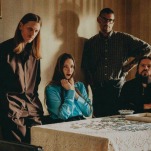-
 Gallery: Tyler Childers and Medium Build at Forest Hills StadiumBy Paste StaffOctober 18, 2025 | 10:00am
Gallery: Tyler Childers and Medium Build at Forest Hills StadiumBy Paste StaffOctober 18, 2025 | 10:00am -
 The 250 Greatest Albums of the 21st Century So Far: 50-1By Paste StaffOctober 17, 2025 | 9:00am
The 250 Greatest Albums of the 21st Century So Far: 50-1By Paste StaffOctober 17, 2025 | 9:00am -
 Watch Cassandra Coleman's Paste Session in ChicagoBy Matt IrvingOctober 16, 2025 | 2:46pm
Watch Cassandra Coleman's Paste Session in ChicagoBy Matt IrvingOctober 16, 2025 | 2:46pm -
 The 250 Greatest Albums of the 21st Century So Far: 100-51By Paste StaffOctober 16, 2025 | 9:30am
The 250 Greatest Albums of the 21st Century So Far: 100-51By Paste StaffOctober 16, 2025 | 9:30am -
 The 250 Greatest Albums of the 21st Century So Far: 150-101By Paste StaffOctober 15, 2025 | 9:30am
The 250 Greatest Albums of the 21st Century So Far: 150-101By Paste StaffOctober 15, 2025 | 9:30am -
 The 250 Greatest Albums of the 21st Century So Far: 200-151By Paste StaffOctober 14, 2025 | 9:00am
The 250 Greatest Albums of the 21st Century So Far: 200-151By Paste StaffOctober 14, 2025 | 9:00am -

-

- More Music Features
-
 Every Taylor Swift Album RankedBy Ellen Johnson and Paste StaffOctober 19, 2025 | 9:00am
Every Taylor Swift Album RankedBy Ellen Johnson and Paste StaffOctober 19, 2025 | 9:00am -
 Best New Albums: This Week's Records to StreamBy Paste StaffOctober 17, 2025 | 2:30pm
Best New Albums: This Week's Records to StreamBy Paste StaffOctober 17, 2025 | 2:30pm -
 10 Songs You Need to Hear This Week (October 16, 2025)By Paste StaffOctober 16, 2025 | 2:30pm
10 Songs You Need to Hear This Week (October 16, 2025)By Paste StaffOctober 16, 2025 | 2:30pm -
 10 Songs You Need to Hear This Week (October 9, 2025)By Paste StaffOctober 9, 2025 | 12:00pm
10 Songs You Need to Hear This Week (October 9, 2025)By Paste StaffOctober 9, 2025 | 12:00pm -
 Best New Songs (October 2, 2025)By Paste StaffOctober 2, 2025 | 2:00pm
Best New Songs (October 2, 2025)By Paste StaffOctober 2, 2025 | 2:00pm -
 Best New Songs (September 25, 2025)By Paste StaffSeptember 25, 2025 | 2:00pm
Best New Songs (September 25, 2025)By Paste StaffSeptember 25, 2025 | 2:00pm -

-

- More Music Lists
-
 Courtney Barnett Returns With Ferocious New Single “Stay in Your Lane”By Casey Epstein-GrossOctober 15, 2025 | 12:09pm
Courtney Barnett Returns With Ferocious New Single “Stay in Your Lane”By Casey Epstein-GrossOctober 15, 2025 | 12:09pm -
 This Is Lorelei Announces Holo Boy, a “Prequel” to His Debut LPBy Tatiana TenreyroOctober 15, 2025 | 10:00am
This Is Lorelei Announces Holo Boy, a “Prequel” to His Debut LPBy Tatiana TenreyroOctober 15, 2025 | 10:00am -
 R&B Legend D'Angelo Dead at 51By Tatiana TenreyroOctober 14, 2025 | 1:27pm
R&B Legend D'Angelo Dead at 51By Tatiana TenreyroOctober 14, 2025 | 1:27pm -
 Zach Bryan Provokes MAGA Idiots With New Anti-ICE Song Teaser, Calls Response "Misconstrued"By Matt MitchellOctober 7, 2025 | 1:20pm
Zach Bryan Provokes MAGA Idiots With New Anti-ICE Song Teaser, Calls Response "Misconstrued"By Matt MitchellOctober 7, 2025 | 1:20pm -
 Joyce Manor to Release I Used To Go To This Bar in JanuaryBy Matt MitchellOctober 7, 2025 | 11:20am
Joyce Manor to Release I Used To Go To This Bar in JanuaryBy Matt MitchellOctober 7, 2025 | 11:20am -
 Rush to Embark on First Headline Tour in 11 YearsBy Matt MitchellOctober 6, 2025 | 2:00pm
Rush to Embark on First Headline Tour in 11 YearsBy Matt MitchellOctober 6, 2025 | 2:00pm -

-

- More Music News
-
 Tame Impala Is Spread Too Thin On DeadbeatRating6.4
Tame Impala Is Spread Too Thin On DeadbeatRating6.4 -
 Time Capsule: Green Day, InsomniacRating8.7
Time Capsule: Green Day, InsomniacRating8.7 -
 They Are Gutting A Body Of Water Confront False Pleasures on LOTTORating8.9
They Are Gutting A Body Of Water Confront False Pleasures on LOTTORating8.9 -
 On And Your Song is Like a Circle, Skullcrusher Makes Peace With Looking BackRating7.7
On And Your Song is Like a Circle, Skullcrusher Makes Peace With Looking BackRating7.7 -
 Sudan Archives Marches to the Beat of Her Own Drum Machine On The BPMRating8.1
Sudan Archives Marches to the Beat of Her Own Drum Machine On The BPMRating8.1 -
 Militarie Gun Blow Up, Break Down, and Break Through On God Save the GunRating8.5
Militarie Gun Blow Up, Break Down, and Break Through On God Save the GunRating8.5 -

-

-

-



































